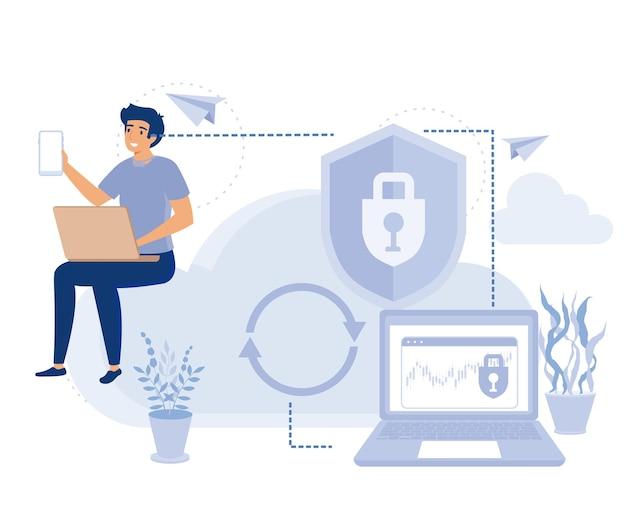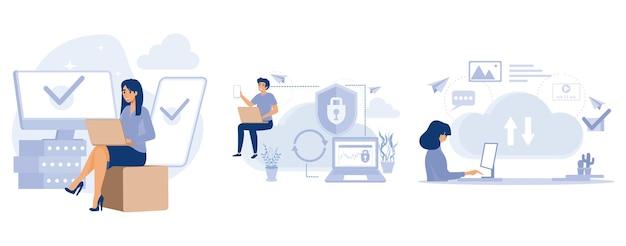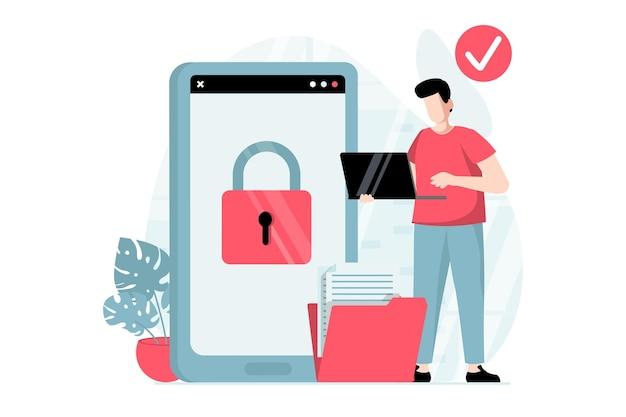As more and more businesses shift their operations to the cloud, Software as a Service (SaaS) is fast becoming the go-to model for software delivery. SaaS offers businesses the ability to access and use software applications over the internet rather than having to install and operate them on their own computers or servers.
However, as convenient as SaaS is, it does come with some security risks that businesses must address. While SaaS providers take on the responsibility of securing their platform, clients must also be aware of the potential risks and ensure that they ask the right security questions.
In this comprehensive blog post, we’ll delve into the world of SaaS security and explore what businesses should look for when considering a SaaS solution. We’ll also answer some common questions, such as what is a SaaS questionnaire? What are the five key security elements of SaaS model?
So, if you’re interested in ensuring the security of your business data in a SaaS environment, read on!
SaaS Security Questions: What You Need to Know
In today’s digital age, security is an essential aspect that businesses must consider when it comes to Software as a Service (SaaS) solutions. With so much confidential data in the cloud, it is crucial to ensure you are secure. Here are some common SaaS security questions and their answers:
What Kind of Data Will the SaaS Vendor Store
It is crucial to know what kind of data the SaaS vendor will store in their servers. You should ask the vendor to detail which types of data they will collect, how they will store it, and who will have access to it. Be sure that sensitive data is appropriately handled and that the vendor has a privacy policy in place.
How Does the Vendor Secure Data
The security of your data depends on how the SaaS vendor secures it. You should ask the vendor questions like, “Do you encrypt stored data?” “Do you back up stored data?” “What security measures do you have in place for accessing the data?” You should also check to see if the vendor has a good track record when it comes to security breaches.
What Happens to Data Once You Stop Using the SaaS Solution
It is essential to know how your data will be disposed of once you stop using the SaaS solution. The vendor should detail how they will erase your data from their servers, who will do it, and what happens to the backups.
What Kind of Support Is Available for Security Issues
Make sure that you know what kind of support is available for security issues. It is essential to have a support system in place that can provide assistance if a data breach occurs or if you have any security-related concerns.
What Are the Risks Involved in Adopting SaaS
Like any other technology, there are risks involved in using SaaS solutions. You should ask the vendor what measures they have in place to mitigate these risks. You should also ask if they have any specific security certifications or audits that they have undergone.
In conclusion, security should be a top priority when it comes to adopting SaaS solutions. By asking the right questions, you can ensure that your data is secure and that your business is protected. Remember to ask about data storage, security measures, data disposal, support, and risks involved in adopting SaaS. By doing so, you’ll have a better idea of the security measures that the vendor has in place, which can help you make an informed decision.
What is a SaaS Questionnaire
If you’re a SaaS user, you’ve probably heard of the term “SaaS questionnaire.” It’s a series of questions formulated to evaluate how secure a company’s SaaS technology is. Essentially, a SaaS questionnaire is a form of security assessment aimed at determining the safety of a company’s cloud-based services.
What Does a SaaS Questionnaire Include
A good SaaS questionnaire should include questions that evaluate the security of a company’s SaaS model, data governance policies, data protection policies, and operational processes. Typically, a questionnaire comprises various categories such as:
Legal and Compliance
This category includes questions that help to ensure compliance with legal and regulatory requirements, such as:
- How do you ensure that your SaaS products and services comply with relevant data protection laws?
- What policies do you have in place to ensure the security and privacy of customer data?
Data Protection
This category encompasses questions that determine how well a company protects its customer data, such as:
- Describe your data encryption policies and the standards you follow.
- Do your employees undergo security awareness training?
- What measures do you have in place to protect against unauthorized data access?
Operations and Management
This category includes questions that assess how well a company’s operations and management processes are designed for security, such as:
- How often do you conduct vulnerability assessments and penetration testing?
- How do you ensure that data is available and secure in the event of a disaster or outage?
Benefits of SaaS Questionnaires
SaaS questionnaires provide many benefits to both vendors and customers. For vendors, they help to highlight areas that require improvements and provide valuable insights into how to improve their products and services. For customers, they provide peace of mind by assuring them that their sensitive data is secure and protected.
In summary, SaaS questionnaires are a vital tool in assessing the security of SaaS products and services. They help to ensure that companies comply with legal and regulatory requirements, protect customer data against unauthorized access, and have robust security practices in place.
What to Look for in SaaS Security
When it comes to SaaS security, there are a few things that you should keep in mind to ensure that you are taking the necessary precautions to protect your data:
Encryption
Encryption is one of the most critical components of SaaS security. It converts your data into an unreadable format that only you can decipher with a decryption key. Look for SaaS applications that offer encryption for both data in transit and at rest. This ensures that your data is protected both while you’re using the app and when it’s stored on the server.
Access Control
Access control is another crucial component of SaaS security. It allows you to control who has access to your data and what they can do with it. Look for SaaS applications that offer robust access control features, such as role-based access control and multi-factor authentication. This ensures that only authorized users can access your data.
Auditing and Monitoring
Auditing and monitoring are essential for tracking who is accessing your data and what they’re doing with it. Look for SaaS applications that offer auditing and monitoring features, such as audit trails and real-time monitoring. This allows you to identify any unauthorized access or suspicious activity quickly.
Compliance
Depending on your industry, you may be subject to various compliance requirements. Look for SaaS applications that are compliant with industry-specific regulations such as HIPAA, GDPR, or SOC 2. This ensures that your data is handled in accordance with the legal and regulatory requirements.
Data Backup and Recovery
Data backup and recovery are critical in case of data loss or corruption. Look for SaaS applications that offer regular data backups and a robust data recovery plan. This ensures that your data is always protected, and you can recover it quickly in case of any disaster.
In conclusion, keeping your data safe is crucial when using SaaS applications. Look for applications that offer robust encryption, access control, auditing and monitoring, compliance, and data backup and recovery features. By taking these steps, you can ensure that your data is protected from unauthorized access and is always available when you need it.
5 Key Security Elements of SaaS Model
Businesses rely on SaaS products to simplify complex processes and streamline operations. These cloud-based applications are known for their ease of use, cost-effectiveness, and scalability. However, as more sensitive data is stored on the cloud, it becomes increasingly important to ensure that the SaaS model is secure. Here are five key security elements that SaaS vendors need to consider when designing their products.
1. Authentication and Authorization
Authentication and authorization are essential to ensuring SaaS security. A strong authentication process verifies the identity of users and prevents unauthorized access to data. Authorization determines what data users can access based on their roles and privileges. A SaaS solution must provide both strong authentication and authorization to ensure the security of your data.
2. Data Encryption
Data encryption is crucial to protect your data from unauthorized access. Encryption ensures that data can only be accessed by authorized users with the correct encryption key. SaaS vendors must ensure that encryption is implemented throughout the entire data lifecycle, including storage, transmission, and usage.
3. Physical Security
Physical security of the data centers is important to protect against theft, natural disasters, and other physical threats. Data centers must be located in secured facilities, with proper access controls and monitoring systems in place. SaaS vendors must also ensure that their data centers are compliant with industry standards and regulations.
4. Data Backups and Disaster Recovery
SaaS vendors must provide robust backup and disaster recovery solutions to ensure that data is not lost in case of a disaster. Backups must be taken regularly to an off-site location, and disaster recovery processes must be tested regularly to ensure that they work effectively.
5. Ongoing Security Monitoring and Risk Assessment
SaaS vendors must continually monitor their products for security and performance issues. They must also conduct regular risk assessments to ensure that their products meet industry standards and regulations. This proactive approach to security ensures that any potential security issues are addressed before they become a problem.
In conclusion, a SaaS solution must provide robust security measures to protect your data. Authentication and authorization, data encryption, physical security, data backups and disaster recovery, and ongoing security monitoring and risk assessment are the essential elements of SaaS security that every vendor must consider. By implementing these measures, SaaS vendors can ensure that their products meet industry standards and provide the security their customers need.


